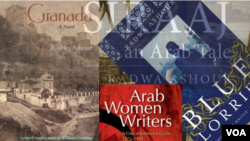Radwa Ashour, the Egyptian author, writer, and professor of American and English literature, died in Cairo late Sunday after a long illness. She was 68.
Ashour was born in the Cairo suburb of Manial Al-Rodah in 1946. She attended Cairo University, earning a B.A. in English in 1967 and her M.A. in comparative literature in 1972. In 1975, Ashour obtained her Ph.D. in African-American literature from the University of Massachusetts at Amherst.
Egyptian Author Radwa Ashour
Egyptian Author Radwa Ashour
- 1967: Started teaching at Ain Shams University
- 1972: Helped establish the Higher Committee for Writers and Artists in Egypt
- 1975: Received her PhD in African American Literature, University of Massachusetts at Amherst
- 1983: Published Siraaj, the story of a revolt by Yemenis against their island's despotic sultan
- 1985: Published Hajar Dafi (A Warm Stone)
- 1989: Published Khadija wa Sawsan
- 1994: Published Granada Trilogy
- 1995: Won first prize at Cairo Arab Women’s Book Fair for Granada
- 2005: Co-edited The Encyclopedia of Arab Women Writers, A Critical Reference Guide: 1873-1999
- 2006 She supervised, edited translation into Arabic of The Cambridge History of Literary Criticism, Vol. 9
Ashour published seven novels, including the highly-publicized "Granada Trilogy," a tale of life in the mixed culture that existed in Granada, Southern Spain, before the expulsion of the Arabs and Jews in the 1490s. The novel, translated by Harvard University, was voted one of the top 100 Arab literary works and received Book of the Year Award in 1994.
Her novel “Blue Lorries,” about Nada, the daughter of a French mother and Egyptian father, a political activist, is considered a bittersweet chronicle of life in Cairo and beyond.
Another novel, Siraaj, predicted the uprising in Yemen. It was set in the late nineteenth century on a mythical island off the coast of Yemen. Siraaj tells the story of a mother and son as they are drawn inextricably into a revolt against their island's despotic sultan.
Ashour also published biographical works and translations of poetry and literary studies, including "Gibran and Blake: A comparative study".
Ashour was awarded the 2007 Constantine Cavafy Prize for Literature, one of the highest Greek awards.
Radwa Ashour, widely mourned by her readers and fellow writers on Twitter, was a strong advocate for the independence of universities in Egypt and a founding member of the March 9 Movement for the independence of universities from political influence.
Ashour is survived by her husband, Palestinian poet Mourid al-Barghouthi, and her son, poet and scholar Tamim al-Barghouthi.





